- Home
- Deborah Harkness
The World of All Souls Page 53
The World of All Souls Read online
Page 53
Robert Hutchinson, Elizabeth’s Spymaster. An introduction to the dangerous world of subterfuge and intrigue that was the Elizabethan secret service.
Brian Levack, The Witch Hunt in Early Modern Europe. A lucid yet scholarly introduction to the witch-hunts between 1450 and 1700.
Ninya Mikhaila and Jane Malcolm-Davies, The Tudor Tailor: Reconstructing Sixteenth-Century Dress. Insights into the construction of period clothing, with suggestions for how to make your own garments.
Liza Picard, Elizabeth’s London. An informative overview of the city, its people, and the main events of the period.
Francine Segan, Shakespeare’s Kitchen: Renaissance Recipes for the Contemporary Cook. You could read an Elizabethan cookbook, but Segan’s book updates ingredients, measurements, and cooking methods to fit modern kitchens.
John Stow, A Survey of London. Historian John Stow (c. 1525–April 6, 1605) compiled this contemporary account of the city, its customs, and notable landmarks.
The Book of Life
The final volume in the All Souls trilogy develops many subjects—history, alchemy, genetics—that are introduced in A Discovery of Witches and Shadow of Night.
The history of the Voynich manuscript is as tangled and complex as its contents are marvelous and mysterious. A facsimile of this Yale University manuscript is now available, with essays by leading scholars on a variety of subjects. See Raymond Clemens, ed. The Voynich Manuscript.
For more information on Jesuit polymath Athanasius Kircher, see Daniel Stoltzenberg’s Egyptian Oedipus: Athanasius Kircher and the Secrets of Antiquity.
An excellent overview of the Ripley scrolls and their alchemical meaning is available for download online: Aaron Kitch, “The Ingendred Stone: The Ripley Scrolls and the Generative Science of Alchemy,” Huntington Library Quarterly (2015), www.docfoc.com/kitch-the-ingendred-stone-the-ripley-scrolls-science-of-alchemy-RADU.
If you’re interested in why Diana Bishop had the birth-room experience she did in the book, take a look at this edition of Jane Sharp’s The Midwives Book: Or the Whole Art of Midwifry Discovered (1671), edited and with an introduction by Elaine Hobby.
Yale’s Beinecke Library, like the Bodleian, is a treasure trove for book lovers. A peek into that magical world can be found in Kathryn James, An Inspiration to All Who Enter: Fifty Works from Yale University’s Beinecke Rare Book and Manuscript Library.
Be sure to check Deborah Harkness’s website at deborahharkness.com for more resources, updates, and fan material.
Acknowledgments
Writing The World of All Souls has been a labor of love for the whole team. As with all collaborative labors, there are many people to thank who have helped us to realize our dream.
The team would like first to thank Chris Russell, Emily Wunderlich, Francesca Belanger, and the All Souls family at Viking and Penguin for the hard work they put into this beautiful volume, as well as the team at Headline in the UK (especially Mari Evans, Caitlin Raynor, and Vicky Palmer). We are also, and always, indebted to Sam Stoloff for his tireless efforts on the book’s behalf and for believing in the project when it was nothing more than a crazy idea.
Claire Baldwin would like to thank her fellow contributors Jill, Lisa, and Colleen for working so well together on the book—and for having so much fun while doing so! As for Deb, Claire sends huge thanks for appointing her as team leader for the project, and for continuing to share the All Souls journey with her.
Colleen Madden would like to acknowledge and shout crazy admiration and love for the three men in her life, as well as Claire and her fellow authors. Colleen acknowledges it has been a wild ride, and would love to do it again—but not right away!
Lisa Halttunen is grateful for once more being invited to join the amazing voyage of the good ship “All Souls.” Thanks also goes to her fellow team members, who made this part of the journey such a pleasure; and to her sister, Karen, and dear friend Leonardo for their encouragement.
Jill Hough would like thank her co-conspirators for being both inspiring and all-around good people. She is grateful, as always, for her family, Paul, Zoe, and Mia, and for their unflagging support and patience with her divided attention while this book was written. Last but not least she would like to thank Deb for discovering the marvelous world of All Souls and its creatures (particularly Gallowglass) and for sharing them (especially Gallowglass).
As for Deb, she is indebted to all of those mentioned previously—without whose support nothing would have ever been committed to paper. She would like to especially thank Claire for her unflagging enthusiasm and support; Colleen for her inspiring images; Lisa for always being able to put her hands on the missing information and the correct grammar; and Jill for understanding just how rich and complex the world of All Souls really is. Deb would also like to acknowledge the support of her family who have taken on the further adventures of the Bishops and de Clermonts with grace and understanding, especially Karen and Baxter, in spite of the fact that these imaginary friends absorb a lot of her time and attention.
Finally, we are—all of us—constantly amazed and awed by the devotion of the readers to this series. It is to the All Souls trilogy’s loyal readers, each and every one of you, that this book is dedicated.
About the Author
DEBORAH HARKNESS is the number one New York Times bestselling author of A Discovery of Witches, Shadow of Night, and The Book of Life. A history professor at the University of Southern California, Harkness has received Fulbright, Guggenheim, and National Humanities Center fellowships.
What’s next on
your reading list?
Discover your next
great read!
* * *
Get personalized book picks and up-to-date news about this author.
Sign up now.
*Mark Collins Jenkins, Vampire Forensics: Uncovering the Origins of an Enduring Legend (National Geographic Books, 2010).
*Robert Graves and Raphael Patai, Hebrew Myths: The Book of Genesis (New York: Random House, 1986), 65–69.
*Mary Schons, “Witch Trials in the 21st Century,” National Geographic, Jan. 21, 2011, http://education.nationalgeographic.org/news/witch-trials-21st-century.
*Quote from Sir Thomas Bodley, recorded in The General Biographical Dictionary, edited by Alexander Chalmers (London, 1812).
*Owen Davies, Grimoires: A History of Magic Books (Oxford: Oxford University Press, 2009), p. 1.
*Alexander Roob, Alchemy & Mysticism (Cologne: Taschen, 2005), 129.
*www.youtube.com/watch?v=EbmhpNaVtts.
*Deborah Harkness, “A View from the Streets: Women and Medical Work in Elizabethan London,” Bulletin of the History of Medicine 82, no. 1 (Spring 2008): 52–85.
*A. A. Benson, “The Ocean Has Its Bezoar, Too: In Aquaculture—Public Health, Regulatory and Management Aspects,” Proceedings of the 6th U.S. Food and Drug Administration Science Symposium on Aquaculture, February 12–14, 1980, New Orleans, 1982 (College Station: Marine Information Service, Sea Grant College Program, Texas A&M University), http://texasseagrant.org/assets/uploads/publications/1982/82–119.pdf, pp. 63–70.
*Thoinot Arbeau, Orchesography, trans. Mary Stewart Evans (New York: Dover, 1967), 12.
*Deborah Harkness, The Book of Life, 469.
*Salomon Trismosin, Splendor Solis: Alchemical Treatises of Salomon Trismosin, Adept and Teacher of Paracelsus (London: Kegan Paul, Trench, Trubner, Broadway House, 1920).
*Aaron Kitch, “Notes and Documents: The ‘Ingendred’ Stone: The Ripley Scrolls and the Generative Science of Alchemy,” Huntington Library Quarterly 78, no. 1: 87–126.
*Homeric Hymns, no. 27, “To Artemis,” lines 1–20 trans. Hugh G. Evelyn-White (Cambridge, MA: Harvard University Press, 1914).
*John Keats, Endymion, The Poetical Works of John Keats (1884). Incidentally, this poem is also the source of the much-repeated line
“A thing of beauty is a joy forever.”
*Seneca, Tragedies, trans. Frank Justus Miller (Cambridge, MA: Loeb Classical Library, Harvard University Press, 1917). In Hercules furens, Seneca tells the story of how Juno brings a madness upon Hercules and causes him to slaughter his wife and children.
*Hesiod, Theogony, lines 240ff., trans. Hugh Evelyn-White (London: William Heinemann, 1922).
*Invocation to the heroes from Catullus 64.1–30, trans. Gutchess (www.englishare.net/literature/POL-HS-Peleus-Thetis.htm), 2001.
*Homer, Iliad, trans. Robert Fagles (New York: Penguin, 1990).
*Homer, Odyssey, trans. Robert Fitzgerald (Oxford, UK: Oxford University Press, 1974).
*From “Völuspá,” a poem collected in the thirteenth-century Poetic Edda.
*Benjamin Thorpe’s translation of the Poetic Edda poem “Grímnismál,” trans. Benjamin Thorpe, in Edda Saemundar Hinns Frôða: The Edda of Saemund the Learned, part 1 (London: Trübner, 1907).
*Montague Summers, The Discovery of Witches. A study of Master Matthew Hopkins, commonly call’d Witch Finder Generall . . . Together with a reprint of The Discovery of Witches from the rare original of 1647 (London, 1928).
*Boethius, The Consolation of Philosophy, trans. Victor Watts (New York: Penguin, 1969).
*Marsilio Ficino, The Book of Life, trans. Charles Boer (Washington, DC: Spring Publications, 1980).
*Isidore of Seville, Etymologiae, trans. Ernest Brehaut, translated quote from the Etymologiae featured in Ernest Brehaut’s An Encyclopedist of the Dark Ages (New York: Columbia University, 1912).
*Johannes Reuchlin, On the Art of the Kabbalah—De arte cabbalistica, trans. Martin and Sarah Goodman (Lincoln, NB: University of Nebraska Press, 1993), 39.
*Gregory of Tours, History of the Franks, trans. Lewis Thorpe (New York: Penguin, 1974).
*A Booke of Christian Prayers or Queen Elizabeth’s Prayer Book (www.lambethpalacelibrary.org/content/elizabethprayerbook, 2015).
*Giambattista della Porta, Natural Magic (London: printed for Thomas Young and Samual Speed at the Three Pigeons and at the Angel in St. Paul’s Churchyard, 1658).
*Heinrich Kramer and James Sprenger, The Malleus Maleficarum, trans. Montague Summers (first published in 1928; London: Arrow, 1971).
*Arthanasius Kircher, Magnes, sive de Arte Magnetica (Rome: apud lodocum Kalcoven, 1641).
*Giordano Bruno, The Heroic Frenzies, trans. Paul Eugene Memmo (Chapel Hill, NC: University of North Carolina Press, 1964).
*Quote from title of original pamphlet: http://quod.lib.umich.edu/e/eebo/A13085.0001.001/1:2?rgn=div1;view=fulltext.
*Original letter as reproduced in the Voynich manuscript, Gerry Kennedy and Rob Churchill (London: Orion, 2004).
*As quoted in A Discovery of Witches, Deborah Harkness. See also: Robert Kehew, Ezra Pound, and W. D. Snodgrass, Lark in the Morning: The Verses of the Troubadours (Chicago: University of Chicago Press, 2005).
*The Song of Armouris, trans. Guy Smoot, ‘Άσμα τοû Άρμούρη: The Song of Armouris—Translation and Commentary’ (www.academia.edu/2641141/Άσμα_τοû _Άρμούρη_The_Song_of_Armouris_-_Translation_and_Commentary, 2016).

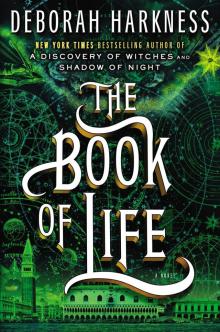 The Book of Life
The Book of Life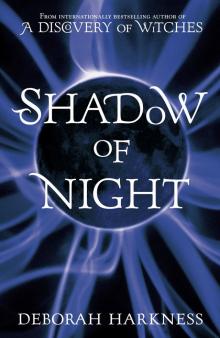 Shadow of Night
Shadow of Night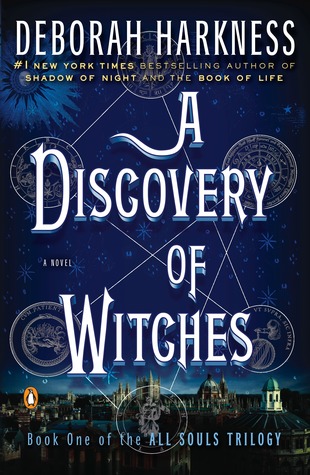 A Discovery of Witches
A Discovery of Witches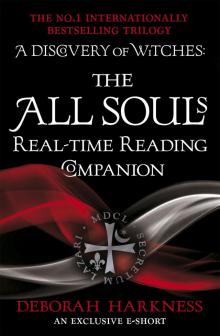 The All Souls Real-Time Reading Companion
The All Souls Real-Time Reading Companion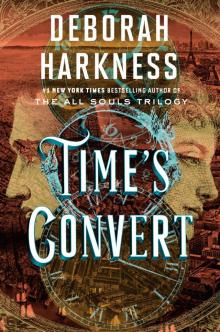 Time's Convert
Time's Convert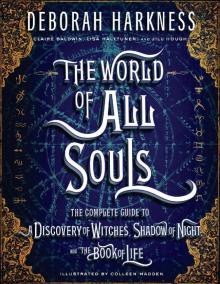 The World of All Souls
The World of All Souls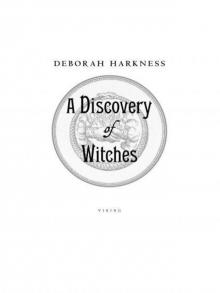 A Discovery of Witches: A Novel (All Souls Trilogy)
A Discovery of Witches: A Novel (All Souls Trilogy)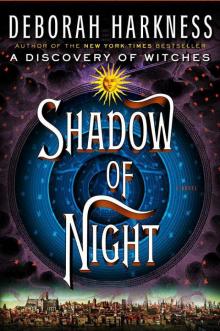 Shadow of Night: A Novel
Shadow of Night: A Novel